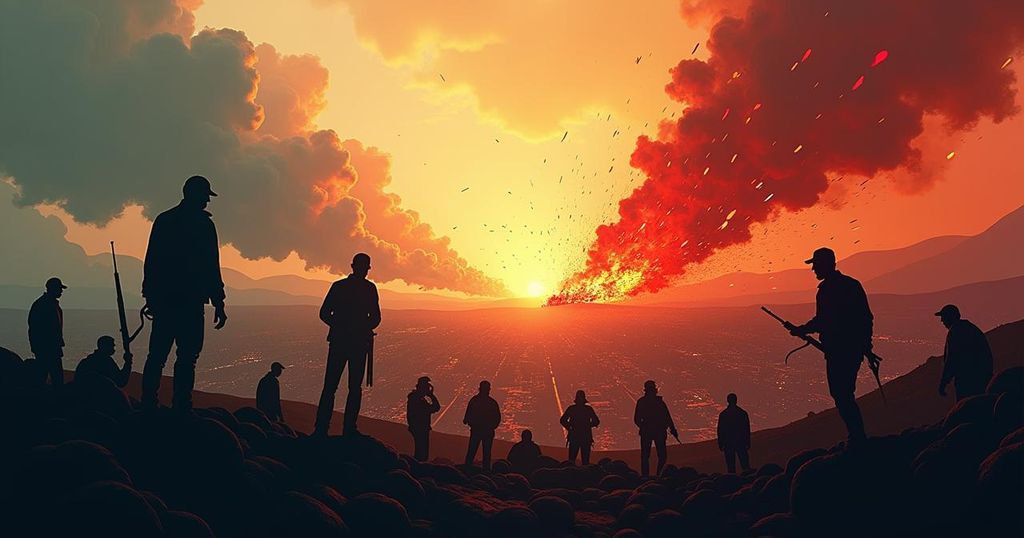Russia’s Strategic Interests Amid Israel-Iran Escalation: Chaos Over War

The Israeli-Iranian conflict escalates, creating challenges for Russia, which navigates its complex relationships in the region. While expressing concern over humanitarian impacts, Russia’s dependency on Iranian military support for its own conflict complicates its position. Analysts suggest that Russia prefers chaos to war as it diverts U.S. attention from Ukraine, reflecting its strategic interests in maintaining regional instability rather than engaging directly in conflict.
The ongoing Israel-Iran conflict poses significant challenges for Russia, especially as it navigates its complicated relationships with both nations. As military operations intensify, particularly in Southern Lebanon, analysts contend that Russia’s interests lie in maintaining chaos rather than escalating to full-scale war. Reports indicate that Anna Levina, a Russian researcher based in Beirut, has been preparing for Israel’s military actions in Lebanon, expressing deep concern for the humanitarian toll amidst increasing Israeli airstrikes and ground operations against Hezbollah. Russia’s foreign policy emphasizes a desire for a multipolar world, contrasting with the U.S.-led order. While Russia has voiced its opposition to Israel’s military expansion into Lebanon and condemned the escalating violence, it faces constraints due to U.S. backing for Israel’s military maneuvers. Notably, Russia’s dependency on Iran for military support in its own conflict in Ukraine has complicated its position, prompting analysts to suggest that Moscow is becoming more closely aligned with Iranian interests in the region. Despite this alignment, experts agree that Russia does not desire another war, particularly one that could divert focus from its military endeavors in Ukraine. Instead, the Kremlin appears to benefit tactically from Middle Eastern instability, which could distract U.S. resources away from Ukraine. Historically, Russia has a complex relationship with both Lebanon and Hezbollah. During the Soviet Union era, there were significant interactions, particularly concerning communist affiliations. However, contemporary relations have shifted, with Russia viewing Hezbollah’s operations with caution, especially regarding its involvement in Syria. Levina notes historical anecdotes to illustrate the fraught dynamics between Russia and Hezbollah, suggesting that while there have been shared interests, they remain delicate and complex. In light of these developments, Russia is strategically positioned to advocate for a diplomatic solution while navigating its dependencies and relationships in a significantly destabilized Middle East. Overall, Russia’s approach appears to prioritize maintaining a chaotic environment that limits U.S. influence, while simultaneously avoiding the pitfalls of direct military conflict. The escalation in the Israel-Iran situation continues to attract global attention, further complicating the already multifaceted landscape of Middle Eastern geopolitics.
The Russia-Israel-Iran conflict represents a crucial intersection of military, diplomatic, and humanitarian considerations, as ongoing military operations have rekindled historical tensions in the region. Russia has a two-fold interest: supporting its military endeavors with Iranian cooperation while strategically avoiding direct conflict inspired by U.S. backing of Israel. The situation is being closely monitored, particularly due to the humanitarian implications of airstrikes and ground assaults in Lebanon and the involvement of local militant groups like Hezbollah. Russia’s historical ties with both Lebanon and Hezbollah add layers to the current geopolitical landscape, further complicating its foreign policy as it seeks to promote its geopolitical interests without inciting a broader war. The humanitarian crisis occurring in Lebanon amidst this backdrop of escalating violence raises significant concerns.
The international community’s engagement with the Israel-Iran conflict requires a nuanced understanding of regional dynamics, particularly regarding Russia’s complex geopolitical stance. As it balances its strategic interests and historical ties, Russia appears focused on fostering instability that may benefit its broader foreign policy goals while calling for restraint and diplomacy from both Israel and Iran. The humanitarian crisis resulting from these conflicts demands urgent attention and solutions to rectify the suffering of the affected populations.
Original Source: www.aljazeera.com







